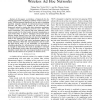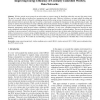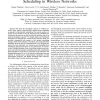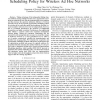163 search results - page 7 / 33 » How Optimal are Wireless Scheduling Protocols |
ICC
2008
IEEE
14 years 1 months ago
2008
IEEE
Abstract—In this paper, we introduce a framework for distributed opportunistic scheduling in multihop wireless ad hoc networks. With the proposed framework, one can take a schedu...
WINET
2002
13 years 7 months ago
2002
Wireless network access protocols can assist nodes to conserve energy by identifying when they can enter low energy states. The goal is to put all nodes not involved in a transmiss...
INFOCOM
2008
IEEE
14 years 1 months ago
2008
IEEE
Abstract—We study the throughput capacity of wireless networks which employ (asynchronous) random-access scheduling as opposed to deterministic scheduling. The central question w...
GLOBECOM
2007
IEEE
14 years 1 months ago
2007
IEEE
— 1 Taking advantage of the independent fading channel conditions among multiple wireless users, opportunistic transmissions schedule the user with the instantaneously best condi...
ECRTS
2007
IEEE
14 years 1 months ago
2007
IEEE
Since wireless ad-hoc networks use shared communication medium, accesses to the medium must be coordinated to avoid packet collisions. Transmission scheduling algorithms allocate ...




